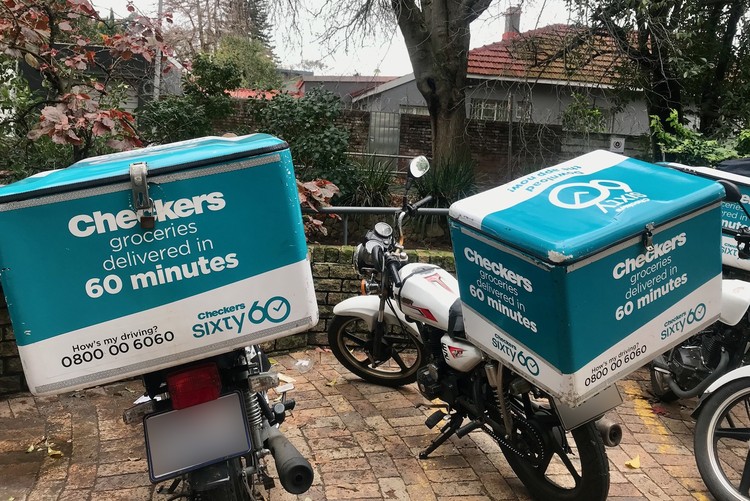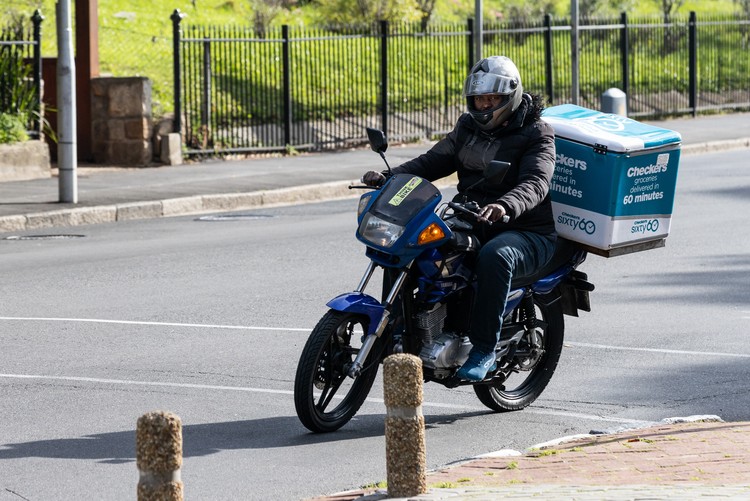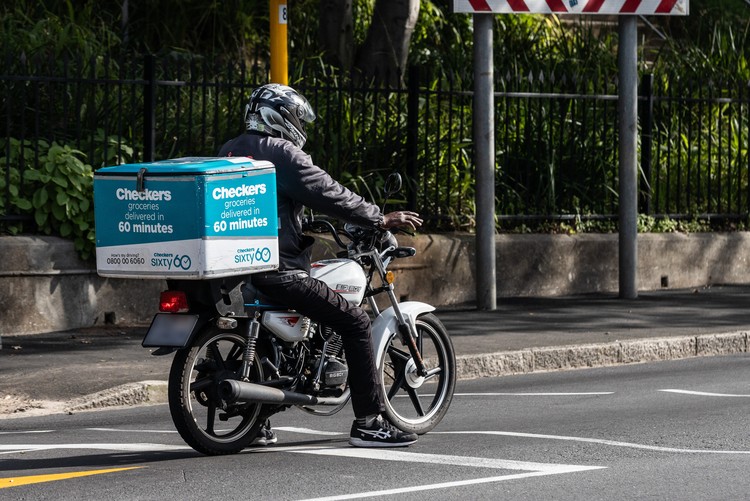The precarious lives of supermarket grocery delivery drivers
While they race on their motorbikes against tight deadlines they have little job security and few employment benefits
Checkers Sixty60 motorbikes have becomes ubiquitous on city streets. Photo: Tariro Washinyira
- Speedy, motorbike-based, supermarket grocery delivery services have increased dramatically since Covid.
- Checkers Sixty60 promises to deliver groceries within an hour of placing the order.
- Drivers are deemed to be independent contractors with few of the normal rights of employees or benefits if any.
- A labour lawyer says the way their employment is structured puts their lives in danger.
While many people rave about the ease and speed of supermarket food delivery services, others on social media rant about the numerous delivery motorbikes ploughing the city streets, calling them on Twitter the “new scourge of our country” and “lawless on the road”.
Although Pick ’n Pay, Woolworths and other big stores also do deliveries, by far the most visible – on the streets of Cape Town at least – are the Checkers Sixty60 motorbikes. Other supermarkets do not offer the same time guarantee. Woolies Dash is a same-day delivery service for Woolworths, while Pick ’n Pay ASAP “strives” to get the order delivered in “as little as 60 minutes from when you place your order”.
“The Sixty60 service guarantee [“no matter the weather”] gives customers their delivery for free if an order arrives more than 30 minutes after the estimated time of arrival. This guarantee is funded by Sixty60 and drivers are not penalised for late deliveries,” says Checkers.
However, a motorbike driver we spoke to – who delivers from 7am to 7pm at Checkers De Grendel – said, “If a customer complains, they deduct R200. It is a difficult job. It’s bad on the road, especially when it rains and when it’s dark.”
Such deductions are not head office policy and we could not verify his claim.
Another delivery rider, at Checkers Rondebosch, told us that he “loves” his job as it provides for his whole family. He works five days a week from 7am to 6pm. After 6pm, he moonlights as an Uber driver.
He prides himself on never having delivered late. “I always deliver in less than 60 minutes,” he says.
He is paid per order, between R25 to R30. He earns R3,000 per week, making 20 to 24 deliveries a day on average.
His bike was purchased through a lease agreement with a linked service contract at R270 per week over 12 months (about R14,000). He has a uniform and rain suit from Checkers Sixty60, for which he paid R1,000.
“We are on our own. No work, no pay. We do not get employee benefits,” he said.
As with other food couriers, the grocery delivery drivers are not regarded as Checkers’ employees, but “independent contractors”.
Michael Bagraim, of Bagraim attorneys and a Democratic Alliance MP, said, “The way in which the employment is structured is pretty bad in that it forces the purported employees to take as many trips as possible putting their lives in danger.”
“I believe someone should come forward and try and challenge it”.
“As independent contractors they get no benefits whatsoever and they have no protection of our labour law.”
Checkers Sixty60 says it is confident that it can “pick [from the shelves] and deliver customer orders in under 60 minutes without compromising driver safety”, and “driver safety takes priority” when implementing and reviewing its delivery network.
It also says the drivers “undergo a thorough vetting process before being contracted” and “delivery vehicles adhere to the necessary legal requirements to be used on public roads and to provide this service”. Ad hoc inspections are done “to verify compliance”.
It says “drivers receive extensive onboarding and training covering a wide spectrum of aspects including safety protocols and accident procedures, defensive as well as anti-hijacking driving techniques”.
The employment structure of supermarket delivery contractors “forces the purported employees to take as many trips as possible putting their lives in danger”, says a labour lawyer. Photo: Ashraf Hendricks
In terms of employment, Checkers says: “Drivers are independent contractors; drivers receive a fee based on their contractual agreement to render a service and are therefore not salaried employees.”
Pick ’n Pay says, “We have outsourced all delivery and collection arrangements to third party service providers.”
The South African Commercial Catering and Allied Workers Union (SACCAWU) spokesperson Sithembele Tshwete said, “They are actually offering a service as entrepreneurs; they are not recognised as employees. If they get injured and unfairly dismissed they have their own processes. They do not use labour courts or the bargaining council.”
“So it’s very difficult for us to assist them… Legally, we can’t organise them into SACCAWU, because technically they’re not employees. There are no guarantees protecting them in terms of the Labour Relations Act. Basically, unions represent employees, independent contractors are not employees.”
He said the Department of Labour has indicated that there are informal discussions on independent contractors and talks are in early stages.
“The Department of Labour is the creator of the policy and it has to begin at the government level and trade unions would be part of the stakeholders that would be discussing this, but the initiator would be the government,” said Tshwete.
But Bagraim argues: “The law is absolutely clear. Should anyone work more than 24 hours in one month for the same employer and they earn less than R21,000 per month, then they automatically with the effluxion of time and by deeming of the law become permanent employees.”
“Many purported employers try their utmost to sign independent contractors’ agreements with these people so as to try and avoid the labour laws altogether. The courts are quite harsh in determining whether a person is actually an employee or an independent contractor. In this particular instance, I think they would be hard pressed to prove they are true independent contractors. Unless the drivers work for a couple of the companies at different times then it cannot be said that they are independent contractors.”
Checkers Sixty60 says it is confident that it can “pick and deliver customer orders in under 60 minutes without compromising driver safety”. Photo: Ashraf Hendricks
Support independent journalism
Donate using Payfast

Don't miss out on the latest news
We respect your privacy, and promise we won't spam you.
© 2023 GroundUp. This article is licensed under a Creative Commons Attribution-NoDerivatives 4.0 International License.
You may republish this article, so long as you credit the authors and GroundUp, and do not change the text. Please include a link back to the original article.
We put an invisible pixel in the article so that we can count traffic to republishers. All analytics tools are solely on our servers. We do not give our logs to any third party. Logs are deleted after two weeks. We do not use any IP address identifying information except to count regional traffic. We are solely interested in counting hits, not tracking users. If you republish, please do not delete the invisible pixel.



